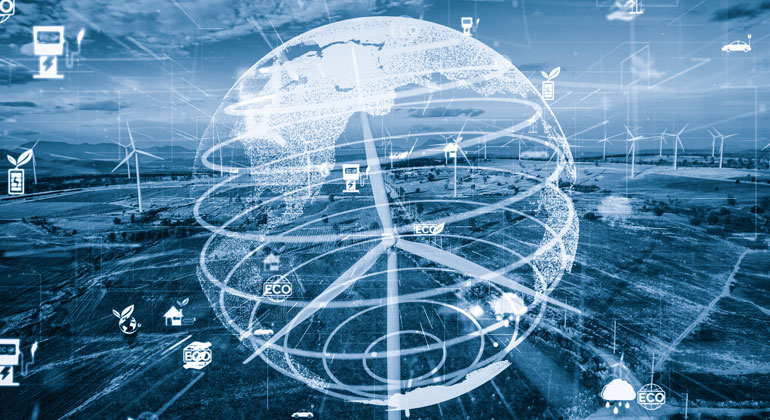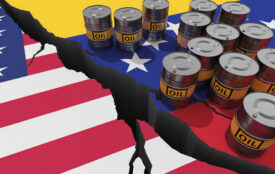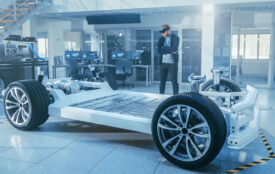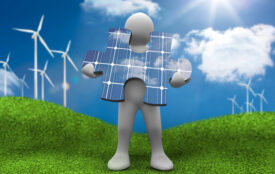The world is renewable
Renewable energies are available everywhere on earth as ambient energy, save us long transport routes and can be used with non-hazardous technology. Nuclear-fossil electricity is produced in a few large power plants, electricity from renewable sources in many locations in small production units. Citizens’ electricity instead of corporate electricity.
The problem with corporations: For a long time, they could only imagine decentralised renewable energy supply as a replacement and supplement to their well-established, centralised and, in their view, proven energy system, because it is also very profitable. The old energy industry had the energy monopoly and was the strongest power in the world. That is why the old energy suppliers remained or remain prisoners of their own system. Everyone who questions this financially strong system, which is intertwined with politics and big business, must be aware of this.
And the future of nuclear fusion?
It is too late for that when it comes to climate change. Corresponding reactors could only be connected to the grid in 40 years at best. We don’t have that kind of time, and we should use the money for the switch to renewable energies that is possible today instead of hoping for miracle cures in the distant future. We cannot afford to indulge in utopian wishful thinking. Based on today’s experience, fusion reactors have only worked for a few minutes. And billions of dollars and euros had to be invested for that: We have something better and decidedly more cost-effective – renewable energies have long been researched and tested and can be implemented on a large scale.
How long will it take to make the world renewable?
Claudia Kemfert, climate expert at the German Institute for Economic Research, writes: ‘Energy science not only largely agrees on the achievability of the goals, but also, in principle, on what the possible paths to greenhouse gas neutrality by 2045 will look like: mainly through higher energy efficiency (with the effect of a drastic absolute reduction in primary energy) and renewable energies, electrification, hydrogen and storage of residual greenhouse gases.
This consensus is surprising in view of the scientific and social struggles over the energy transition since the 1980s. This also applies in international comparison: in the USA, Japan or some European countries such as France or Poland, for example, the scientific and social dispute over national decarbonisation strategies and the role of nuclear energy continues.’ (Footnote: Claudia Kemfert in “Earth For All Deutschland”, page 188). However, scientists at the Wuppertal Institute believe that this target should be achieved as early as 2035 or 2040. The UN Secretary-General is also using drastic words to push for the earliest possible target.
Guterres warns of ‘climate hell’
In a speech unlike any ever given by a world leader, UN Secretary-General Antonio Guterres said on 1 December 2020: ‘Making peace with nature is the defining task of the twenty-first century. It must be the top priority for everyone, everywhere. Following the latest alarming reports by the Intergovernmental Panel on Climate Change, Guterres stated: ‘These reports must ring the death knell for coal and fossil fuels before they destroy our planet. If we join forces now, we can still avert the climate catastrophe.’ In mid-2024, the UN Secretary-General warned of ‘climate hell’: ‘We are playing Russian roulette with our planet… We need to get off the highway to climate hell.’
May 2024 was the twelfth consecutive month in which the global average temperature reached a record high for the respective month, according to the EU climate change service Copernicus. In the face of these warnings, Antonio Guterres called for a funding and advertising boycott of the gas, coal and oil industries. Governments should ban advertising by the entire fossil fuel industry, similar to tobacco advertising. Financial institutions should instead invest in renewable energies.
Guterres called the fossil fuel industry ‘godfathers of climate chaos’ and representatives of ‘madness’. They have blocked progress towards climate-friendly energy for decades. ‘Billions of dollars have been spent on twisting the truth, deceiving the public and sowing doubt,’ said the world’s most senior politician. At the same time, he suggested introducing levies on shipping, aviation and the fuel industry.
‘Many in the fossil fuel industry have shamelessly engaged in greenwashing and tried to delay climate action through lobbying, legal threats and massive advertising campaigns… We cannot accept a future where the rich are protected in air-conditioned bubbles while the rest of humanity faces deadly weather in uninhabitable lands,’ Guterres said.
After his speech, Guterres said that each and every one of us must get involved: in elections, to bring politicians to power who are serious about climate change and who are committed to more climate protection. He thanked young people who are doing this. ‘You are on the right side of history,’ he said. ‘Keep it up.’
A tripling of renewables by 2030
The 28th World Climate Conference 2023 in Dubai decided to triple renewable energies globally between 2023 and 2030. The world is on the verge of achieving this ambitious goal, says the International Energy Agency (IEA) in Paris. We are currently experiencing an unprecedented boom in renewable energies around the world, with China and India leading the way. China is transforming its energy policy the most, India the fastest. From 11 to 22 November 2024, Azerbaijan will host the 29th World Climate Conference, the COP29 in Baku. It is expected that the rich countries will finally create the financial conditions to finance the solar energy transition in the poor countries of the South and thus organise it.
Source
Franz Alt 2024 | Translated with www.DeepL.com/Translator








